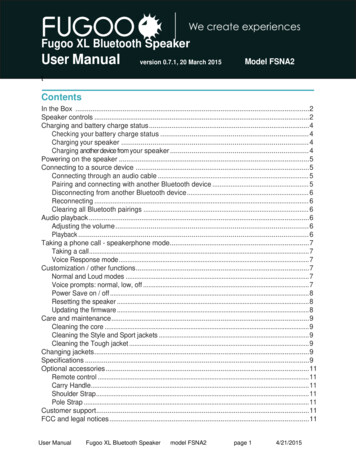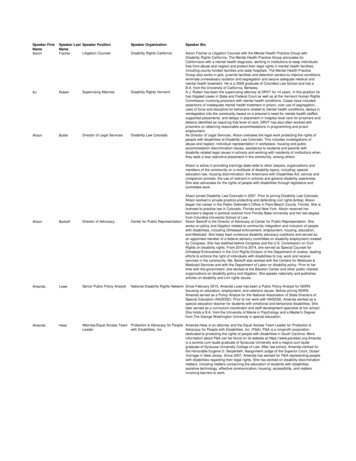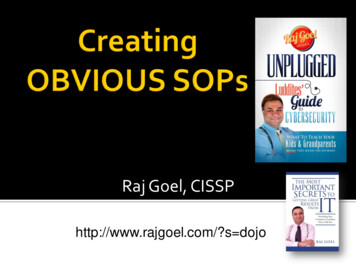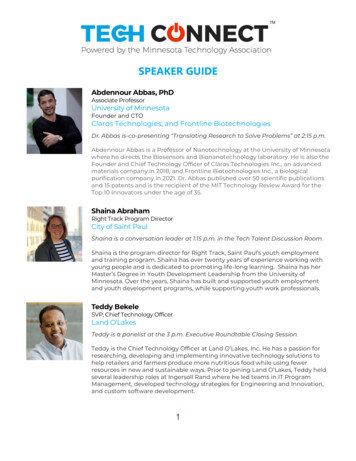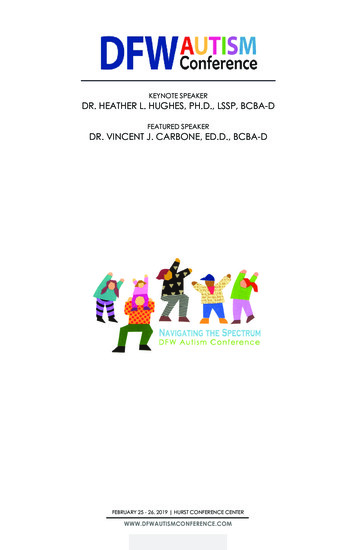
Transcription
KEYNOTE SPEAKERDR. HEATHER L. HUGHES, PH.D., LSSP, BCBA-DFEATURED SPEAKERDR. VINCENT J. CARBONE, ED.D., BCBA-DFEBRUARY 25 - 26, 2019 HURST CONFERENCE CENTERWWW.DFWAUTISMCONFERENCE.COM
WELCOMETO THE2019 DFW AUTISM CONFERENCEThe 2019 DFW Autism Conference brings together experts for twodays of training that focus on ways to improve the quality of life forthose with autism and special needs, their families, caregivers andprofessionals working with them. The presentations will cover areasof behavioral and developmental therapies/strategies and familyissues. It is presented for Educators, Therapists, Health CareProfessionals, Caretakers, Parents and anyone who wants to learnmore about services and treatment for individuals living withAutism, Asperger’s Syndrome, ADD, ADHD and other learningdisabilities. Over the course of time, FEAT-NT’s educationalopportunities and conferences have educated more than 15,000parents and professionals in the autism community.With autism now affecting 1 out of every 59 children (according toCDC) support and education is greatly needed. This training willbring families and professionals affected by autism together forguidance, training, and to share our struggles and accomplishments!Thank you for your attendance. We hope that the informationand training you receive will help you on your journey!With You Every Step of the Way,FEAT-North Texaswww.featnt.org
DAILY SCHEDULEMONDAY FEBRUARY 257:45 AM - 8:15 AMATTENDEE REGISTRATION8:30 AM - 9:30 AMFEAT WELCOME & KEYNOTE WITH DR. HEATHER HUGHES10:00 AM - 10:15 AMBREAK10:15 AM - 11:45 AMMORNING SESSIONS11:45 AM - 1:00 PMLUNCH1:15 PM - 2:45 PMAFTERNOON SESSIONS2:45 PM - 3:00 PMBREAK3:00 PM - 4:30/5:00 PMAFTERNOON SESSIONSTUESDAY FEBRUARY 267:45 AM - 8:15 AMATTENDEE REGISTRATION8:30 AM - 10:00 AMMORNING SESSIONS10:00 AM - 10:15 AMBREAK10:15 AM - 11:45 AMMORNING SESSIONS11:45 AM - 1:00 PMLUNCH1:15 PM - 2:45 PMAFTERNOON SESSIONS2:45 PM - 3:00 PMBREAK3:00 PM - 4:30/5:00PMAFTERNOON SESSIONSSOME SESSIONS MAY LAST 2 HOURSWWW.DFWAUTISMCONFERENCE.COM
KEYNOTE SPEAKERDR. HEATHER L. HUGHES, PH.D., LSSP, BCBA-DDr. Heather L. Hughes is the Executive Director of SpecialPrograms for Eagle Mountain-Saginaw ISD. Sheoversees intervention, programming, andeducational services for nearly 5,000 students. Asa servant leader, her goal is to build the capacityof others to improve life outcomes andopportunities for individuals and families withautism and developmental uniqueness. Dr.Hughes is a Licensed Specialist in SchoolPsychology and a Board Certified Behavior Analyst-Doctoral. Shecurrently serves on several boards of directors for nonprofitorganizations. She is the co-owner of TherapyLink Solutions, alocal clinic providing direct behavior analytic and consultativeservices, specializing in assessment and evidence-basedinterventions and practices. She also serves as an adjunctprofessor at the University of North Texas. Dr. Hughes previouslyserved as the Associate Executive Director of the University ofNorth Texas Kristin Farmer Autism Center. In that role, she wasinstrumental in the planning, development, implementation, andoversight of direct applied behavior analytic services forindividuals and families with Autism Spectrum Disorder. Prior toher work at UNT, Dr. Hughes has served as Director of SpecialEducation, special education coordinator, special educationteacher, and general education teacher in public schools inTexas. She earned her bachelor’s degree in elementaryeducation and two master’s degrees in special education andschool psychology, all from Texas A&M University-Commerce.She also holds endorsements in special education and earlychildhood education, and is a certified educationaldiagnostician. She earned her doctoral degree from theUniversity of North Texas with a research focus in autism. She hasdelivered presentations and keynotes for professionalorganizations both nationally and internationally, on topicsincluding applied behavior analysis, program evaluation,leadership, special education, and autism intervention andinstruction. Most recently, Dr. Hughes received the prestigious“Educator of the Year” award from the Saginaw Area Chamberof Commerce. Personally, Dr. Hughes enjoys her church,community outreach activities and spending time with herchildren and grandchildren.
DR. HEATHER L. HUGHES, PH.D., LSSP, BCBA-DKEYNOTE PRESENTATIONTOGETHER WE CAN MAKE A DIFFERENCEAs an educator, therapist, parent, advocate, citizen, service provider,researcher, student, or leader, we all have opportunities every day toaddress a need, lend a hand, and make a difference in the lives ofothers. Reflecting on two decades of service to the autism community, Dr. Hughes will share her journey and experiences to addressbarriers and build bridges for coordination of care between schools,families, and communities. With a child/person-centered approach toproblem solving, Dr. Hughes will provide insight and inspiration foraddressing needs and improving outcomes for families throughteamwork and collaboration.SESSIONPERSON CENTERED PLANNINGThis session will provide individuals, caregivers and multidisciplinaryteam members with the information and tools necessary to engage inperson-centered planning practices to empower individuals withintellectual and developmental differences by building on their uniqueabilities, skills, and preferences. Attendees will gain an understandingof person-centered planning and the hallmarks of the person-centeredapproach. Various person-centered planning methodologies will bediscussed, as well as, consideration of risks and safeguards. Planningfrom a person-centered perspective seeks to listen, discover andunderstand the individual. It is a process directed by the person thathelps us to learn how they want to live and describes what supportsare needed to help them move toward a life they consider meaningfuland productive.WWW.DFWAUTISMCONFERENCE.COM
FEATURED SPEAKERDR. VINCENT J. CARBONE, ED.D., BCBA-DDr. Vincent J. Carbone is a BoardCertified Behavior Analyst-Doctorate andNew York State Licensed BehaviorAnalyst. He received his graduatetraining in Applied Behavior Analysis(ABA) at Drake University, Des Moines,Iowa. He currently serves as an adjunctfaculty member at Penn State Universityand is a professor in the academictraining programs in Behavior Analysisoffered by The European Institute for the Study of HumanBehavior, Parma, Italy, and the medical school at theUniversity of Salerno, Salerno, Italy. His behavior analyticresearch has been published in several peer-reviewedjournals including the Journal of Applied Behavior Analysis,Behavior Modification, The Analysis of Verbal Behavior,Behavior Analysis in Practice and others. He has served onthe editorial board of several behavior analytic journalsand regularly acts as an editorial reviewer of scientificresearch papers submitted for publication to majorbehavior analytic journals. He is frequently invited to speakat behavior analytic conferences on autism treatmentthroughout the US and abroad. He has provided therequisite university training and supervision to hundreds ofboard certified behavior analysts in the U.S. and overseas.He is the director of autism treatment clinics in New York,Boston and Dubai, UAE.WWW.DFWAUTISMCONFERENCE.COM
DR. VINCENT J. CARBONE, ED.D., BCBA-DTOPICSIMPLEMENTING THE “ESSENTIAL FOR LIVING”CURRICULUM AND TREATMENT METHODS WITHADOLESCENTS AND ADULTS WITH AUTISMChildren with autism and other developmental disabilities havebenefited from treatment programs that emphasize the application ofbehavior analytic principles. Applied behavior analysis (ABA) researchand reports within clinical practice have demonstrated theeffectiveness of this form of treatment to address challenges in theareas of language, social skills, self-care, problem behavior,academics and others. Many of these programs are now informed byB.F.Skinner’s analysis of verbal behavior (1957). The purpose of thisworkshop is to provide an overview of Skinner’s analysis of languageand to describe the benefits of this approach for adolescents andadults with developmental disabilities. The methods included in theEssential for Living by McGreevy and colleagues will be highlightedalong with many video illustrations of clinical applications.TEACHING INTRAVERBAL BEHAVIORMany children with autism acquire mand and tact repertoires but failto develop intraverbal responding. Failure to acquire intraverbalbehavior leads to difficulties in academic, social and over allcommunication. In the past few years the behavior analytic literaturehas included reports of methods to teach the intraverbal. The purposeof this workshop is to present the current research on teachingintraverbal responding which extends Skinner’s 1957, analysis of thisverbal operant. A sequence for teaching intraverbal responding fromsimple to complex will be offered with many video illustrations ofteaching methods within applied settings.WWW.DFWAUTISMCONFERENCE.COM
PRESENTATIONSA-BAAC WITH ABALAUREN RICH, SLP-ASSISTANT, BCBAFor individuals with Autism Spectrum Disorder (ASD), natural speechdoesn’t always come naturally. Augmentative and AlternativeCommunication (AAC) can be used to give these individuals avoice. This presentation will provide an introductory overview ofbehavioral interventions in AAC for ASD. AAC supplements orreplaces spoken language through alternative forms of communication. Low tech and high tech forms of AAC will be reviewed toprovide a plethora of different methods to utilize.of different methods to utilize.ABA & CLASSROOM MANAGEMENTSARAH MCCROAN, BCBA Understand that students with behavior issues are students withskill deficits Understand where some of our most challenging students arecoming from Learn proactive strategies for preventing behavior issues Learn strategies for successfully handling behavior issues oncethey occur Learning about Applied Behavior Analysis and how it can beapplied in a general education classroom setting with a broadrange of behaviorsBREAKING DOWN THE BARRIERS TO EFFECTIVE SOCIAL SKILLSLAUREN RICH, SLP-ASSISTANT, BCBAFriendships are meaningful in life! However the social skills we oftentarget in teaching those with Autism do not lead to meaningfulfriendships. This session will pinpoint procedures and steps towardsbuilding a strong foundation to facilitate meaningful social interactions for early to advanced learners. These procedures are applicable even to those with limited verbal languageBRIDGING THE GAP: POST-SECONDARY EMPLOYMENT & EDUCATION STRATEGIES FORSTUDENTS WITH AUTISMJAMES WILLIAMS, ED.D, CRC, ACASUsing an engaging and honest style, the presenter will discusspost-secondary employment and education strategies for studentswith Autism. This information will be infused with the presenter’sunique professional and personal knowledge as a COO, Vocational Expert, and Certified Rehabilitation Counselor & AdvancedAutism Specialist diagnosed with Asperger’s Syndrome. Thepresenter will also include information about current successfulprogram models, the importance of vocational evaluation, and thefindings of his dissertation which focused on understanding therelationship between successful employment outcomes and parentdemographics, behaviors, and expectations.WWW.DFWAUTISMCONFERENCE.COM
PRESENTATIONSB-CBUILDING POSITIVE RELATIONSHIPS: USING AND TEACHING RECIPROCITY TO BUILDSTRONGER AND MORE HEALTHY RELATIONSHIPS.WESLEY DOTSON, PH.D., BCBA-DWhether its between and teacher and student, staff member and administrator,or students among themselves, healthy and positive relationships form mostreadily when reciprocity is practiced and appreciated. Positive relationships arethe bedrock of effective and engaged classrooms. This talk will explore theconcept of reciprocity as it applies to the formation and maintenance ofpositive relationships built on a voluntary exchange of reinforcement betweenthose in the relationship. Examples of how to teach, label, use, and celebratereciprocity across multiple types of relationships will be offered and discussed.Participants will be challenged to identify and more mindfully cultivate thereciprocal aspects of their relationships with their students and colleagues.COLLABORATIVE PRE-EMPLOYMENT TRANSITION SERVICES FOR STUDENTS WITHAUTISM: PRACTICES & PARTNERSHIPSJAMES WILLIAMS, ED.D, CRC, ACASUsing a collaborative and solution-focused approach, the presenters will focus on innovative practices which may be used byeducators and administrators to build Pre-ETS program partnerships& services through collaboration with providers, employers, andvocational rehabilitation agencies designed to meet the uniqueneeds of students with Autism. All five Pre-ETS domains will becovered including Career Exploration, Work-Based Learning,Counseling on Post-Secondary Training, Work Readiness, andSelf-Advocacy for 14-22-year-old students with disabilities. Thisinformation will be infused with the lead presenter’s unique professional and personal experience with Autism and his work in thefields of Special Education and Rehabilitation Counseling. Inaddition, they will include examples of past, current, and futurePre-ETS partnerships they have created and how similar programscan be replicated throughout Texas.COMMUNITY-BASED INSTRUCTION FROM THEORY TO PRACTICEJENNY KEESE, BCBA AND DR. BETTAG, PH.D., BCBA-DPlease join us as we discuss developmental, neurological, andbehavioral themes that build a framework for thinking through achild’s needs across their lifespan. We will explore theories that laythe foundation for what we see and how we help. As we begin inearly childhood and move across their lifespan, we will emphasiscommunity-based instruction and the practices that make theseprocesses so effective for children and their families.WWW.DFWAUTISMCONFERENCE.COM
PRESENTATIONSC-ECONNECTING THE DOTS BETWEEN BEHAVIOR, HEALTH, WELLNESS AND LEARNINGASHLEY MOORE, APRN, AGACNP-BC & MIKA BRADFORD, CN, CPhTStrategies for successfully collaborating with numerous professionalsfrom diverse specialties in and out of district while staying focusedon the student’s educational needs.Have you ever wondered if the foods you eat and medications youtake could be contributing to your underlying health conditions ordisrupting your ability to focus having brain fog and fatigue, unableto concentrate, or sleep? Do you often question if you’re eatingthe right foods and taking the right medications to address yourhealth concerns? Are you tired of randomly trying new medicationsto help your child focus or pay attention? Whether you are aParent, Educator, or Caregiver looking for answers for yourself or forthe children you love, Ashley and Mika will help connect you toinformation and testing that provides you with results specific toeach person’s individual needs. Learn how personalized medicinecan help identify what foods could be causing, migraines andeczema and which medications you should avoid and those thatare more likely to be of benefit for you based on your genetics. Ifyou are tired of making health decisions with the roll of the dice,join us as we empower you with information and tools that canchange your life!CONTRIVING MOTIVATING OPERATIONS, AN EVIDENCE-BASED PRACTICE FORTEACHING MANDINGCARIN RENEE SHEARER PH.D., BCBA, LBAThis session will review an meta-analysis of studies using contrivingmotivating operations (CMOs) to teach mands with topography-based response forms to individuals with autism spectrumdisorders (ASD). Studies will be reviewed and connected with it'srelation to the milestone levels of Sundberg’s Verbal BehaviorMilestone Assessment and Program Placement (VB-MAPP) as wellas a review of the studies' design strengths. Participants will receivethe opportunity to view video examples of contriving MOs for allthree levels of the VB Milestones and and review steps to effectively implement this procedure in the public school classroom.EFFECTIVE BEHAVIOR PLANS, UNDERSTANDING WHY & HOWLYNDSAY WHEELER, BCBAApplied Behavior Analysis (ABA) is founded on over 500 studiessupporting the effectiveness of working with children with Autismand related disabilities. Changing behavior is the first step toteaching new skills and motivation is key! Learn functions of behavior and how to address problem behaviors effectively by learningto create an effective Behavior Intervention Plan based on theevidence-based strategies through the science of ABAWWW.DFWAUTISMCONFERENCE.COM
PRESENTATIONSE-HESSENTIAL STEPS TO EFFECTIVE PARENT TRAININGDR. REGINA CRONE, PH.D., BCBA-DParent Training is key! Often parent training goals and sessions arescheduled to help facilitate generalizing skills to real life. But is it aseffective as it could be? In this session recent research findings willbe presented and some practical application strategies for EFFECTIVE training parents will be discussed.FEAT-NT ADULT ASPERGER SUPPORT GROUP PANELVARIOUS ADULTS FROM THE FEAT ADULT SUPPORT GROUPCome share with our adult group about their experiences growing up facingchallenges, their eventual diagnosis and what life is like living on the spectrum.The FEAT Adult group is like a family. The FEAT group has grown substantially overthe past 6 years. They are excited to participate again this year at the conference with new members joining in and some familiar faces from previous years.Their insight will provide a wealth of information to teachers, therapists andparents alike on better understanding their students and children.HANGING ON UNTIL HELP ARRIVES: THOUGHTS ON PREPARING FOR AND RESPONDING TOCRISIS BEFORE A BIP IS IN PLACE.WESLEY DOTSON, PH.D., BCBA-DOften the first people who encounter problem behavior in the schools are notthe trained behavioral team who ultimately complete the FBA and BIP for astudent, but are instead teachers, paraprofessionals, and administrators who donot have the same level of training and experience. While this talk is not asubstitute for training in dealing with severe problem behavior, it is designed tohelp educators anticipate and prepare for incidents that may occur in theirclassrooms with students for whom a BIP is not yet in place. The emphasis will beon anticipating and planning for what can be controlled in any classroom, andon some basic principles of safety in responding to difficult situations.HOW TO DEVELOP AND MAINTAIN WORKING RELATIONSHIPSSARAH MCCROAN, BCBA What types of relationships exist?What is the purpose of a relationship?Why do we need other people?What is a healthy relationship?How do we develop healthy relationships?WWW.DFWAUTISMCONFERENCE.COM
PRESENTATIONSI-KINCLUSION OR REVERSE INCLUSION - SOCIAL SKILLS IN A SCHOOL SETTINGTASHENNA GILLMORE, M.ED., BCBAIn this presentation we will look at how to assess prerequisites forinclusion and how to facilitate social skills in a less restrictive environment. We will look at different ways to teach the skills neededand take a look at how motivation plays it's part in the acquisitionof functional social skills.INS AND OUTS OF SUPERVISIONDR. GORDON BOURLAND, PH.D., BCBA-D & DR. REGINA CRONE, PH.D., BCBA-DThe requirements of the BACB for BCBA supervision of differentlevels of personnel will be reviewed. Real-world challenges inproviding that supervision will be addressed and suggestions foraddressing them will be explored by groups of attendees anddiscussed by the group as a whole.JUST SAY, “NO” TO NOCHRISTINA MARTIN, M.S., CCC-SLP, BCBA AND KECIA ADAMS-WRIGHT, M.ED., BCBAIn this presentation for educators, related service providers, andparents, participants will learn the importance of motivation forreluctant learners. This presentation will also address the conceptthat motivation can be maintained through building rapport aswell as focus on the direct and natural reinforcement accessedthrough play.KEEPING THE MAIN THING THE MAIN THINGKAREN MARKLE, MA, BCBAStrategies for successfully collaborating with numerous professionalsfrom diverse specialties in and out of district while staying focusedon the student’s educational needs.Navigating the recommendations of numerous professionals canoften be stressful, limit the effectiveness and implementation of thestudent’s education plan (IEP / Behavior Support Plan). This scenario can be intensified when the student’s educational needsrequires support and intervention from various professionals acrossmany settings. This session will provide strategies for supporting thespecial education student with autism and their families through amultitude of disciplines aimed at maximizing the student’s potential. Learn how you can be a key contributor in setting your teamup for success through the thoughtful collaboration with professionals across many disciplines within the school district and amongstprivate providers within the community.WWW.DFWAUTISMCONFERENCE.COM
PRESENTATIONSG-HLANGUAGE ACROSS THE LIFESPANCHRISTINA MARTIN, M.S., CCC-SLP, BCBA AND KIMBERLEE FLATT, PH.D., LPC, BCBA, LBAThis presentation serves to reflect on the growing expanse betweenthe language and social repertoire of individuals with autism andtheir peers without autism. It is through this vantage point that we,as educators, practitioners, and parents, can begin to preventatively anticipate the language and social needs of individuals withautism across the lifespan and plan accordingly. Additionally, thispresentation will identify members that may be included within theindividual’s constellation of care.MY JOURNEY WITH ASPERGER’SDANIEL DURANY, BA Grasp deeper understanding of what life is like living with Asperger’s Syndrome (AS) Defining and explaining the unique cognitive patterns of peoplewith AS Devising strategies to improve cognitive processing and problemsolving techniques Recognizing some of the unique social patterns associated with ASNAVIGATING THE AUTISM ARD SUPPLEMENT FOR PARENTS AND EDUCATORSMICHAEL J. TUCKER, M.ED., AUTISM CONSULTANT, ESC REGION 11Texas regulations (TAC 89.1055) require ARD/IEP committees toconsider eleven strategies for students with autism. Schools sometimes use the term “Autism Supplement” to refer to a form that theyuse at ARD/IEP meetings to address these strategies.NAVIGATING SPECIAL EDUCATION: DEVELOPING AND WRITING IEP GOALSGAIL WAYMAN, M.ED., BCBAAn essential component of an effective IEP is goals that are observable andmeasurable so that the ARD Committee is better able to evaluate progress andmake informed decisions regarding placement and services. The purpose of thispresentation is to help parents and professionals increase their knowledge andskill relative to selecting and writing IEP goals so that they may contribute moreeffectively when participating in the process of developing an IEP. Topics includethe role of assessment, selecting prioritized goals, how to make goals observableand measurable and why that’s important, measurement, mastery criteria andgenerating progress reports.WWW.DFWAUTISMCONFERENCE.COM
PRESENTATIONSP-RPERSONAL SUPPORT NETWORKS: ENRICHING LIVES IN THE PRESENT AND PREPARING FORTHE FUTUREDENISE SONLEITNER, TEXAS PARENT TO PARENT: TEXAS NETWORK CONNECTIONSThe best guarantee of a safe and secure future for a person with adisability is to have caring friends, family members, and acquaintances involved in his or her life. Personal networks build a community of caring volunteers around a person at risk of isolation; theypromote planning and social opportunities in the present, assistwith decision-making, and work to be sustainable after parents canno longer be available. Texas Parent to Parent's (TxP2P) TexasNetwork Connections (TxNC) program helps families explore,develop and maintain personal support networks for their sons anddaughters who have a disability ections). Launched in Austin in 2016, TexasNetwork Connections is now expanding to DFW. Denise Sonleitner,from Texas Parent to Parent, will provide information on what anetwork is and how it can help an individual and a family in thepresent and for the future, while building social opportunities and acommitted circle of support. Come learn more about personalnetworks and how to get a personal network started for yourself,your son or your daughter!READING IS AN ESSENTIAL SKILL FOR LIFEDR. REGINA CRONE, PH.D., BCBA-DBelieve it or not reading is a life skill and the gateway to so manyopportunities. This presentation will demonstrate strategies usingthe principles of Applied Behavior Analysis to differentiate instruction for teaching essential reading skills. Learn how to teachphonics to fluency across a spectrum learners, non-verbal to verballearners, and build confident readers. Video examples of studentsdiagnosed with Dyslexia and Autism will be shared to facilitate thepractical application of these strategies across all abilities.WWW.DFWAUTISMCONFERENCE.COM
PRESENTATIONSSSHARE THE ROAD: A JOURNEY OF COLLABORATIONKATE LUNDGREN, OTR, MBA, SIPT, CHRISTINA MARTIN, CCC-SLP,BCBA, MEENA KARTHIK, PT & SYDNEY PERRICONE, SLPIt is important for therapy providers to collaborate in providingtreatment to children with ASD. Collaboration and consultationacross disciplines ensures best practice and enhances treatmentoutcomes for therapy. Participants will learn practical ways inwhich disciplines can work together and will be able to identifybarriers to collaboration, as well as strategies to enhance communication.SOCIAL EMOTIONAL LEARNING FOR TEENSSARAH MCCROAN, BCBAThe knowledge, skills, and attitudes within the CASEL five competency clusters are especially relevant during adolescence becauseyouth at this stage are going through rapid physical, emotional,and cognitive changes.Longitudinal studies have shown that increased social and emotional competence is related to reductions in a variety of problembehaviors including aggression, delinquency, substance use, anddropoutSPEECH SOLUTIONS: THE SLP, BCBA AND PARENT.THE TRIANGLE OF SUCCESS.KATHERINE (KAT) LEE, BAWhen the Lee's son was diagnosed with autism, they thought theautism was the biggest obstacle of his life. As his treatmentprograms evolved, the devastation of his communication deficitsbecame clear. Over a period of years, Katherine Lee, SLP MiekkaThye and BCBA-D Tracy Guiou along with other key professionalsbegan to work closely together as a team, implementing procedures and collecting data to help drive their decisions. In thispresentation, Kat will explain how the relationship came about,how it evolved and how it has impacted her son and famiily's life,combining a data driven communication program with the processof becoming a communicator, the work of the past and work ofthe future.STRATEGIES TO INCREASE BUY-IN AND ENGAGEMENT WITH TREATMENT PLANNING FORSTUDENTS WITH SEVERE PROBLEM BEHAVIORWESLEY DOTSON, PH.D., BCBA-DThe most difficult part of most intervention programs is getting the entire team onthe same page in regards to program goals, procedures, and desired outcomes.This talk will explore factors that influence the effective design and implementation of behavior plans for students with severe problem behavior in the schools.The focus will be on identifying why team members may or may not supportspecific elements of treatment plans, and will offer strategies to increase teammember engagement and support for intervention activities.WWW.DFWAUTISMCONFERENCE.COM
PRESENTATIONSS-TSTRUCTURE, ROUTINES AND TASK ORGANIZATION: PULLING IT ALL TOGETHER FORSTUDENT SUCCESSDR. STACEY CALLAWAY, PH.D.Utilizing structure and routines for students with autism is an evidence basedpractice that has shown promise for students with ASD for over 20 years. Thispresentation will review the principles of structured teaching, the benefits ofstructure in the classroom, and provide participants with visuals of a variety ofclassroom strategies.Structure teaching is presented as an evidence based practice both by theNational Professional Development Center on Autism Spectrum Disorders (2014)and the National Research Council (2014). Structured teaching methodsoriginated from the TEACCH program out of the University of North Carolina. Thepremise of structure for students with ASD is based on the culture of autism andembraces their inherent need for structures and routines. Structure can be usedto facilitate independence by teaching students with ASD to transition betweenactivities with visual supports. Additionally, students are taught to complete avariety of tasks through structured work systems. This presentation will exposeparticipants to a variety of environmental modifications and classroom supports.TEACHING INFERENCE TO STUDENTS WITH AUTISM SPECTRUM DISORDERS (ASD)MICHAEL J. TUCKER, M.ED., AUTISM CONSULTANT, ESC REGION 11It is frequently observed that children on the autism spectrum andthose who struggle with reading tend to be concrete, literal thinkers. These students have difficulty with abstract concepts such asinferring a character's unstated motive. When reading, theconcrete thinkers often focus on minute physical details and missthe big picture. Participants will explore research-based strategiesfor teaching inference and moving the students from concrete toabstract thinking.TEACHING PROBLEM SOLVING SKILLS TO STUDENTS.TAYLOR BROOKS, BA, CASE SPECIALISTA driving goal of educational programming for adolescents and young adults isteaching them skills required to function independently as adults. One aspect ofthis is the ability to make decisions about difficult topics such as which job topursue, whether to end a friendship, or how to budget time or money. This talkwill describe a systematic approach to teaching problem-solving skills to studentsthat will help them carefully consider their options when making a difficultchoice or solving a challenging problem. The talk will provide a step-by-stepdescription and model of both how to teach and also to use this problem solvingapproach.TEXAS AUTISM SPECTRUM DISORDER
Behavior, Parma, Italy, and the medical school at the University of Salerno, Salerno, Italy. His behavior analytic research has been published in several peer-reviewed journals including the Journal of Applied Behavior Analysis, Behavior Modification, The Analysis of Verbal Behavior, Behavior Analysis in Practice and others. He has served on

